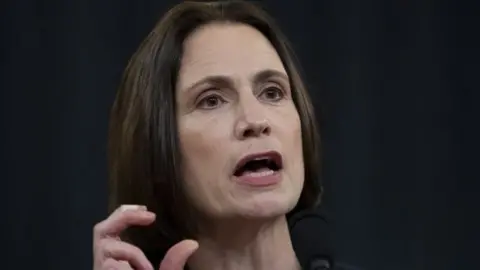Fiona Hill: UK coal miner's daughter turned top US Russia expert
 EPA
EPAWhen former White House national security adviser Fiona Hill took to the stand to testify in the US impeachment inquiry, she began with the story of her life.
Unlike many others speaking in the investigation into US President Donald Trump's dealings with Ukraine, Ms Hill has not always been a US citizen.
The straight-talking Russia expert hails from humble beginnings in the north-east of England.
The 54-year-old told lawmakers of how she came from a family of coal miners who "always struggled with poverty".
"When my father, Alfred, was 14, he joined his father, brother, uncles and cousins in the coal mines to help put food on the table," she explained.
She also confirmed a story which illustrates her own toughness, as well as a sense of humour. At 11 years old, a school boy set her pigtails on fire while she was taking a test. She put the fire out with her own hands and finished the test.
"It had some very unfortunate consequences. Afterwards, my mother gave me a bowl haircut. So for the school photograph... I looked like Richard III," she joked.
Her father's dream
Ms Hill spoke in the inquiry of an affinity she had always felt to the US.
Hailing from the market town of Bishop Auckland in County Durham, Ms Hill noted that "both the region and my family have deep ties to the United States."
"I was born... in the same region George Washington's ancestors came from... My paternal grandfather fought through World War I in the Royal Field Artillery, surviving being shot, shelled, and gassed before American troops intervened to end the war in 1918," she said.
While her father was unable to realise his "dream of emigrating to America", she said he had always hoped that someone in the family would make the move.
For Ms Hill, that opportunity came in the 1980s.
During an academic exchange in the then Soviet Union, she met an American professor who told her about graduate scholarships to the US.
In 1989, Russian-speaking Ms Hill made the move across the Atlantic to study at Harvard University, where she ultimately earned her PhD.
'Land of opportunity'
Ms Hill, who became a US citizen in 2002, says the country has offered her opportunities she "would never have had" in England.
"I grew up poor with a very distinctive working-class accent. In England in the 1980s and 1990s, this would have impeded my professional advancement," she told investigators. "This background has never set me back in America."
In a career spanning nearly three decades, she has established herself as a top expert on the former Soviet Union and describes herself as a "nonpartisan, nonpolitical national security professional".
She has worked closely with three presidents - George W Bush, Barack Obama and Donald Trump - to offer expert advice on Russia and the former Soviet republics.
It is her role on Mr Trump's National Security Council (NSC) that has brought her to the impeachment inquiry.
The Trump scandal
According to the New York Times, Ms Hill's decision to accept a role in the NSC in 2017 "strained friendships and made her a target of right-wing conspiracy theorists who spread rumours that she was a Democratic mole".
Ms Hill told the inquiry that when she accepted the position she thought she could help with Mr Trump's "stated goal of improving relations with Russia, while still implementing policies designed to deter Russian conduct that threatens the United States".
But, she said, the president disregarded the advice of senior advisers who said Russia had meddled in the 2016 election, instead listening to the views of his personal lawyer Rudy Giuliani and pushing a false theory that it was Ukraine.
She told lawmakers this was a "fictional narrative that has been perpetrated and propagated by the Russian security services themselves."
While Ms Hill stepped down shortly before the phone call at the centre of the inquiry, she witnessed earlier talks between US and Ukrainian officials in which she said a deal between the two presidents was mentioned.
Ms Hill told the inquiry of a "couple of testy encounters" she had with ambassador to the European Union Gordon Sondland over Ukraine, because he did not keep her informed of "all of the meetings he was having".
On one occasion, she said: "I was actually, to be honest, angry with him. And I hate to say it but often when women show anger it's not fully appreciated, it's often pushed off onto emotional issues, perhaps, or deflected on other people."
The remark and wider testimony earned her praise on social media, where she was described as relatable and courageous.
But the attention was not something she was looking for when she stepped away from the NSC, apparently hoping to spend more time with her family.
"I don't think she was thinking, 'I'm going to go out in a blaze of glory, take a moral stand and testify.' That was definitely not her intention. She just wanted to do her job with no fuss or drama," her former colleague and friend Tom Wright told the New York Times.
